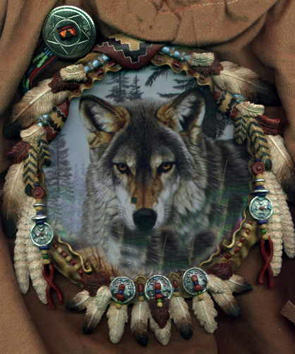 Myth
And
Myth
And  Myth
And
Myth
And
Legend of The Wolf
Over the centuries, wolves have come to mean different things to different cultures. Revered as deities or reviled as devils, wolves have often paid with their lives for crimes they did not commit.
The indigenous people of North America both admired and emulated wolves. At a tribal level, the respect for wolves was powerful. The Native Americans perceived that wolves lived in ways that made their packs strong.
Wolves provided food that all, even the sick and old could eat. What wolves didn't eat themselves was easily fed upon by the larger communities of ravens, foxes, coyotes and bears. Wolves say to the education of their young, and defended their territory from other wolves.
 For some Native Americans, wolves were
personal totems because the individual understood the important qualities that
made the single wolf stand out within its pack; stamina, the ability to track
well and to go without food for long periods.
For some Native Americans, wolves were
personal totems because the individual understood the important qualities that
made the single wolf stand out within its pack; stamina, the ability to track
well and to go without food for long periods.
The wolves of the Native American were not the same wolves of the European imagination. During the Middle Ages, a belief in werewolves was widespread. The legends of werewolves also support the false beliefs that wolves are vicious, savage beasts.
When European settlers arrived in America, they brought the dark wolves of their imaginings with them.

Famous fairy tales such as "Little Red Riding Hood," and "The Three Little Pigs," depict wolves as blood-thirsty beasts that use lies and cunning to fill their bellies with innocent victims. These fairy tales contribute to the misconception that it is morally right to kill wolves. The desire to kill the "Big, Bad Wolf" was fueled by hate, fear and misunderstanding; it helped to create one of the most devastating extermination programs ever devised against a single species. But wolves are not evil or good. They are just animals so as to have been misunderstood.
Occasionally the wolf is portrayed as the hero of the tale, as in "The Jungle Book" or the legend of Romulus and Remus, in which orphaned children are adopted and raised by wolves.
Most folklore and fairy tales, however, tell us that wolves kill humans yet wolves are extremely shy and fearful of people, even when in the company of a large pack. Humans have never been one of the items found on the menu at any 'wolf cafe'.
It is time to come to an understanding of wolves and their importance in the natural world, an understanding based on fact, not fairy tale.
Introduction
[ What is A Wolf ? ] [ Myth And Legend of The Wolf ] [ Physiology of The Wolf ] [ Communication And Behavior of The Wolf ]
[ Family and Social Structure of The Wolf ] [ Hunting And Selection of Prey ] [ The Wolf Today ]
Poems
[ The Lone She-Wolf ] [ Fight of The Midnight Wolf ] [ The Spirit of The Wolf ] [ The Spirituality of Silent Wolf ]
[ The Lady of The Wolves ] [ The Wolf ]
Miscellaneous
[ Did You Know ? ] [ The Language of Wolves ] [ Wolves - Worldwide ] [ Questions And Answers About Wolves ]
Guest Book
[ Special Dedication ] [ Sign My Guest Book / Feedback ] [ View My Guest Book ] [ e-mail Me ]
Best view in IE5. Pentium II. True color (24 bits). Resolution 640 x 480